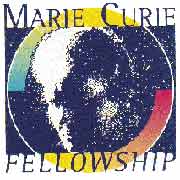
Marie Curie Fellowships at the efms
 With the Marie Curie Fellowships, the EU Commission offers financial support to outstanding young scientist also in the area of social sciences. This programme was set-up to encounter the fact that the EU - compared to other regions of the world - faces a lack of young scientists both in terms of their number and their mobility. Moreover, scientific teams in disadvantaged regions of the Community are relatively isolated. The aim of the Marie Curie Fellowship programme is to tackle these problems. One of the programme's point of emphasis focuses on so-called Training Sites of Excellence for PhD students. With the Marie Curie Fellowships, the EU Commission offers financial support to outstanding young scientist also in the area of social sciences. This programme was set-up to encounter the fact that the EU - compared to other regions of the world - faces a lack of young scientists both in terms of their number and their mobility. Moreover, scientific teams in disadvantaged regions of the Community are relatively isolated. The aim of the Marie Curie Fellowship programme is to tackle these problems. One of the programme's point of emphasis focuses on so-called Training Sites of Excellence for PhD students.
The Marie Curie Training Sites offered PhD students the opportunity to do a part of their work at these sites. The measure is particularly meant for specialised training centres, which were enabled this way to transfer their knowledge to the PhD students. For becoming eligible for participating in the programme, the training sites had to be internationally recognised in their fields of work and needed to be experienced in the international training of PhD students.
In the area of migration research, institutions at eleven European universities (University of Amsterdam, Otto-Friedrich-University of Bamberg, University of Bradford, Deusto University in Bilbao, Dublin University (Trinity College), University of Helsinki, University of Liege, University of Louvain, University of Ljubljana, University of Padova, University of Poitiers) were chosen as Training Sites of Excellence for Marie Curie fellows within the 5th Framework Programme of the EU. The european forum for migration studies (efms) was the institute chosen at the University of Bamberg.
Over the course of the four years of funding, the efms tutored annually one to two scholars during their stays of a maximum of 12 and a minimum of six months. At the same time, PhD students of the University of Bamberg went to the other universities as fellows. This first Marie Curie fellow at the efms was Petri Hautaniemi from the University of Helsinki, who worked on a research project about the integration of Sudanese refugees in Finland and Germany (in 2002/2003). From September 2003, Petra Aigner from the Trinity College in Dublin was fellow student at the institute and worked on her project about the discourse on foreign nationals in Upper Austria. As PhD student at the University of Bamberg, Maren Borkert was
awarded from a fellowship at the University of Padova/Italy where she investigated the integration policy in Italy.
For the fellows, the Marie Curie Fellowships offered the opportunity to fulfil one prerequisite required for obtaining the European Doctorate on Migration, Diversity and Identities, i.e. to do research at one of the foreign university participating in the network during a minimum of three months.
Meanwhile, the programme has expired. A follow-up application is currently being prepared.
Funding: EU Commission, DGXII / DG XXII
Local researcher: Wolfgang Bosswick
|





